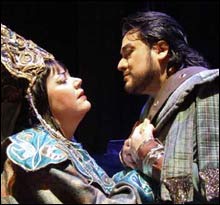James Levine and Deborah Voigt, Collage New Music, Teatro Lirico’s Turandot
By LLOYD SCHWARTZ | February 6, 2007

TURANDOT: Plenty of voice, plenty of heart. |
James Levine was back in front of the BSO after his Christmas break, and as good as at least one of the guest conductors was (Sir Colin Davis), Levine’s conducting was more exciting, and so was his program: the last of his revelatory Beethoven/Schoenberg pairings.The concert was probably the shortest he’s yet conducted here — over before 10 pm! It began and ended with two of Beethoven’s tightest, most condensed pieces, the chilling Coriolan Overture (music for a now forgotten play by Heinrich Joseph von Collin depicting the same characters as in Shakespeare’s bitter tragedy), with its grim chords and final dissolution into ominous silence. Symphony Hall reverberated with the powerful outbursts, and Levine captured Beethoven’s unsettling rhythmic juxtaposition of string section against string section.
Symphony No. 8 was genial, witty (a startling Haydnesque whisper ends the first movement), alternating delicate scampering and raucous vigor. Despite a few rough edges, it was one of the most engaging renditions I’ve heard of this least-performed of Beethoven’s nine symphonies.
In between came two vocal works that couldn’t be more different — except for their subject matter. Schoenberg’s monodrama Erwartung (“Anticipation”) is a one-character opera, with an expressionistic libretto by Schoenberg’s friend Marie Pappenheim about a woman desperately searching a mysterious forest for her lover/betrayer and finding his bloody body. Is she the murderer? Is she dreaming? Schoenberg said that the entire half-hour piece depicts barely a moment of the woman’s consciousness — a very complex moment. Beethoven’s “Ah! perfido” (“Oh, faithless one”), his early concert aria in the style of Mozart, dramatizes the standard rage and sorrow (self-pity?) of another woman who has been abandoned by her lover yet still craves him.
Both pieces present extraordinary vocal workouts for a soprano, but they’re musical worlds apart. Beethoven’s small orchestra achieves power through a traditional formality. The Schoenberg (completed in 1909 but not performed until 1924) is a nightmare of atonality. It’s hard to follow any musical theme. The orchestration is both sinister and magical, with shimmering dream-world passages for celesta and harp. The text echoes the morbid eroticism of Oscar Wilde’s Salome, as adapted for Richard Strauss’s opera, which premiered four years earlier — was it still ringing in the ears of Schoenberg and Pappenheim? “Never before have I loved anyone so. . . . Your smiles and your words. . . . I loved you so. . . . My darling, my only darling. . . . Did you kiss her often. . . . While I was dying of longing?”
The soprano was Metropolitan Opera star and Levine favorite Deborah Voigt. I wouldn’t mention her dramatic weight loss (she now looks like a grown-up Barbie doll) except that her new sveltitude is what she’s talking about in her interviews, and she seems more interested in showing off her figure and clinging gown than in projecting any meaning or feeling about these pieces. “Dying of longing”? She could have been singing about meeting a friend for coffee. “I’ve never heard 40 minutes of singing without any nuance!” remarked a friend on the way out. It was good to hear both pieces sung with such gleaming sound, though Schoenberg’s orchestral climaxes occasionally overpowered it. And it didn’t help Voigt’s projection that she was so score-bound, even in the less-challenging Beethoven. Still, this coupling was an illuminating comparison.
 Topics
Topics:
Music Features
, Entertainment, Giorgio Lalov, John Heiss, More  , Entertainment, Giorgio Lalov, John Heiss, Carlo Gozzi, Frank Epstein, Olly Wilson, Music, Wolfgang Amadeus Mozart, Classical Music, Opera, Less
, Entertainment, Giorgio Lalov, John Heiss, Carlo Gozzi, Frank Epstein, Olly Wilson, Music, Wolfgang Amadeus Mozart, Classical Music, Opera, Less 